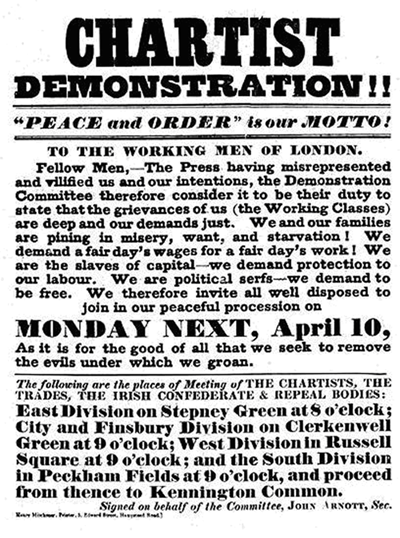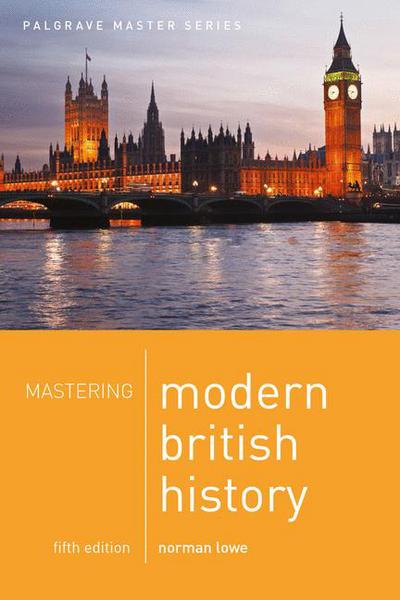


Are you sure you want to reset the form?
Your mail has been sent successfully
Are you sure you want to remove the alert?
Your session is about to expire! You will be signed out in
Do you wish to stay signed in?
The Chartist campaigns
Study Sources A to F and then answer the questions that follow.
Source A:
| Extracts from the Chartist petition drawn up in 1838. We, your petitioners, dwell in a land whose merchants are noted for their enterprise, whose manufacturers are very skilful and whose workmen are proverbial for their industry...Yet we find ourselves overwhelmed with public and private suffering. We are bowed down under a load of taxes, and our workmen are starving. Capital brings no profit, labour no reward; the workhouse is full and the factory deserted. We have looked on every side to find out the causes of distress, and we can discover none in nature or in Providence. It was the fond expectation of the people that a remedy for most of their grievances would be found in the Reform Act of 1832...They have been bitterly deceived...The Reform Act has transferred power from one domineering faction to another, and left the people as helpless as before... We perform the duties, therefore we must have the privileges of free men. Therefore we demand universal suffrage. To be exempt from the corruption of the wealthy and the violence of the powerful, the suffrage must be secret. We demand annual parliaments and...for every representative chosen, a fair payment for the time which he is called upon to devote to the public service. Source: Quoted in R.G.Gammage, History of the Chartist Movement, Browne & Browne, 1854. |
Source B:
The Chartist poster advertising the 1848 meeting on Kennington Common

Source C:
| Extracts from the objects of the London Working Men’s Association, 1839. 2. To seek by every legal means to place all classes of society in possession of their equal political and social rights. 7. To publish our views and sentiments in such a form as shall best serve to create a moral yet energetic public opinion; so as eventually to lead to a gradual improvement in the condition of the working class, without violence or commotion. Source: Quoted in D. Holman (ed.), Portraits and Documents: Earlier Nineteenth Century, 1783-1867, Hutchinson, 1965. |
Source D:
| From a speech by William Taylor, a Lancashire Chartist leader, in 1839 We are to be free, though we wade through streams of blood...Do we read in ancient or modern history of any nation in bondage becoming free without the use of physical force? Source: Quoted in Christopher Thorne, Chartism, Macmillan, 1966. |
Source E:
| From a newspaper article in The Bolton Chronicle, Saturday 17 August 1839. SERIOUS AND ALARMING RIOTS IN BOLTON On Sunday last the Chartists marched to church...and a great fear was expressed by inhabitants of the town that violence would be attempted; therefore about 15,000 special constables were sworn in. It is not for us, as reporters, to express our opinion regarding the origin of such Chartist meetings....whether incited by the mayor or his friends, it is not for us to consider. TUESDAY - at five o'’clock [a.m.] the Chartists again assembled, numbering about 300. The police officers at first made no attempt to disperse the mob when it first collected, but later arrested the leaders. Then showers of stones were thrown in all directions and the commotion arrived at a tremendous pitch. The mayor and the magistrates consulted and the riot act was read. The military was instantly called out and their prompt arrival discouraged the multitude. Source: The Bolton Chronicle, 17 August 1839. |
Source F:
| Comments from Sir Charles Napier, the general sent to deal with the Chartists in the North of England in 1839. [1839] June 29th. I hate the poor law, but it is not a cause of the mischief in itself, it is only a train to fire the mine: the evils produced by the manufacturing system and the debt are attributed by the people to the new poor law...a population starving one week, earning forty shillings the next... August 17th. Bolton is the only place where shot has been fired, but only three there, and those from the eagerness of the magistrates. August 19th. Everywhere a sudden calm has succeeded the storm; it is unnatural, for the causes of discontent still exist. The fact is that the Chartist leaders’ calculations are quite at fault; they have found the difficulty of uniting their people in simultaneous efforts. The mayor and corporation of Bolton are said to be Chartists and the constables everywhere are, more or less, and all avow that the people are oppressed. Men are restless and discontented with poverty; they have all its sufferings and have not the principal pleasures. Source: Quoted in R.Brown and C.Daniels (eds.), Nineteenth Century Britain, Macmillan, 1980. |
